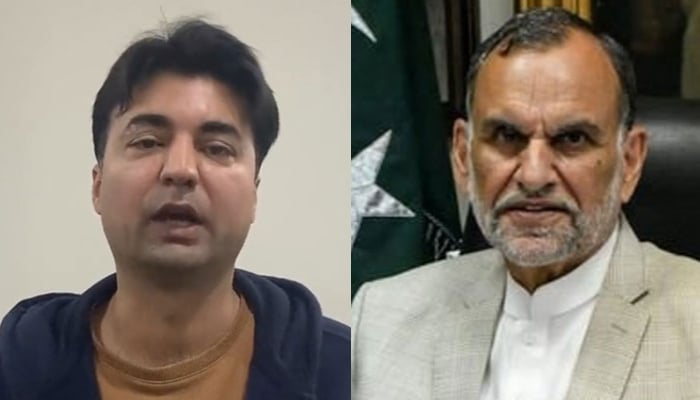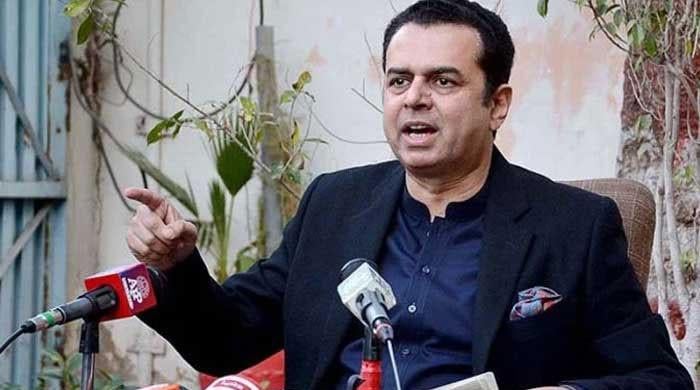Senate polls: ECP rejects nomination papers of PTI leaders Murad Saeed, Azam Swati
Electoral body issues list of 30 "approved" candidates from KP for elections slated for April 2
March 20, 2024

- Saeed, Swati were candidates on general, technocrat seats from KP.
- ECP also rejects PTI-P leader Mahmood Khan's nomination papers.
- Electoral body issues list of 30 "approved" candidates from KP.
PESHAWAR: In a setback for the Pakistan Tehreek-e-Insaf (PTI), the Election Commission of Pakistan (ECP) Wednesday rejected the nomination papers of senior leaders Murad Saeed and Azam Swati — party's nominees from Khyber Pakhtunkhwa on general and technocract seats, respectively — for the upcoming Senate elections.
Furthermore, the ECP has also rejected Pakistan Tehreek-e-Insaf-Parliamentarians (PTI-P) leader Mahmood Khan's nomination papers dealing a blow to the former chief minister's bid to join the upper house.
As per the final list of candidates issued by the electoral body, nomination papers for 30 candidates from Khyber Pakhtunkhwa have been approved for the Senate polls of which 16 are for general seats, eight for technocrat and six for women's seats.
The development comes as the electoral body is set to hold elections for 48 seats of the upper house on April 2 which were vacated after the expiration of the six-year term of the incumbent senators on March 11.
Members of Balochistan, Khyber Pakhtunkhwa (KP), Sindh and Punjab assemblies would vote to elect members against seven general seats, two women and two seats for technocrats, including Ulema.
Punjab and Sindh assemblies would also vote for one seat each for non-Muslims.
Meanwhile, members of the National Assembly will elect a senator for one general seat and one seat for technocrats, including Ulema from the federal capital, it added.
Following the culmination of the scrutiny process of nomination papers on March 19, candidates can file appeals against acceptance, or rejection of nominations till March 21 which will be disposed of by the tribunal by March 25.
The final and revised list of candidates will be published on March 26, followed by the last date for withdrawal of candidature on March 27.
Meanwhile, the polling for the Senate elections will be conducted in Islamabad's Parliament House, as well as all four provincial assemblies from 9am to 4pm.
It is pertinent to know that Saeed is among several PTI leaders who have been "underground" fearing their arrests over their alleged involvement in the May 9 riots — triggered after the arrest of Imran Khan in a graft case last year — which saw military installations being targeted and vandalised across the country.
ECP's code of conduct for Senate polls
A day earlier, the electoral body issued its code of conduct for the upcoming Senate polls under Article 218(3) of the Constitution read with with Section 233 of the Elections Act, 2017.
The rules, which apply to political parties, contesting candidates, election agents and voters bars them from soliciting "support or assistance of any person in the service of Pakistan or any public office to promote or hinder the election".
The code of conduct also prohibits the president and governors from taking part in election campaign.
Furthermore, voters will not be allowed to possess a "mobile phone or other such electronic device or gadget which can be used to take a photograph of the marked ballot paper."
Also, candidates are required to open an "exclusive account or dedicate existing bank account with any branch of a scheduled bank before the date fixed for scrutiny of nomination papers and maintain, or cause to be maintained, a register of receipts and expenditures".
"The returned candidates shall submit their return of election expenses to the Returning Officer on Form C within five days from the date of election in accordance with sub-section (3) of section 123 of the Act," the ECP's code of conduct reads.









